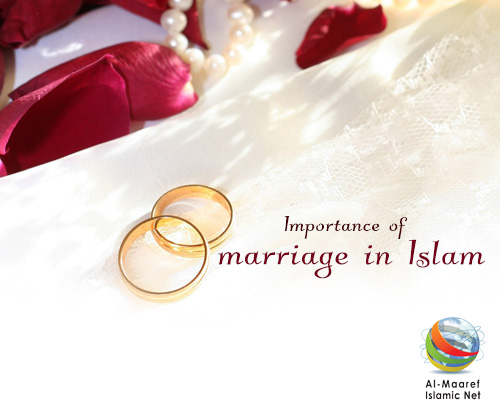The Environments Prevailing on the Familial
Relationship
There are certain religious headlines which accomplish the general environments
on the basis of which the husband and the wife face life with each other. These
environments are the ones governing the conducts of the husband and the wife
between each other, and they can be summarized in the following points:
1- Affection: The Most High Allah says, {… and He has put between you
affection and mercy…}1 Affection is the likeness, and likeness is
the psychological inclination which represents a basic ground for mutual
understanding and harmony. It is also the affection which must be translated and
manifested in the deeds, as is mentioned in the following narrative ascribed to
The Noblest Prophet (Allah’s prayers and peace bestowed upon him and his
Household): «The man is rewarded for raising the mouthful of food to the mouth
of his wife.»2
2- Mercy: It is the other point to which the just mentioned Aya points
out. Next to affection comes mercy which means tenderness and gentleness. The
Most High Allah did not settle it for the affection and love relationship
between the husband and the wife but He added to it the gentleness and
tenderness which appear through the behaviors which manifest the act of giving
that expects nothing in return. It is related that The Noblest Prophet (Allah’s
prayers and peace bestowed upon him and his Household) said, «Fear Allah in the
two weak creatures: the orphan and the woman, for the best among you are the
best with their wives.»3
Moreover, mercy is manifested in the conducts of the wife; it is related in the
discourse, «Offering her husband [even] a gulp of water will be better for every
woman than the worship of a whole year during which she fasts all the days and
stays up all the nights [i.e. in praying and supplication].»
3- The Honorable Association: Once the affection and the mercy prevail in
the hearts of the husband and the wife, then their imprints will appear in the
daily life and in the association between them in the form of {…And live with
him honorably…}4. For harm can not issue from the one who has
affection and mercy towards the other one: {…and do not treat them in such a
harmful way that they be obliged to leave…}5
This honorable association is manifested in various behaviors which the
narratives indicate. With respect to the woman, it is ascribed to The Noblest
Prophet (Allah’s prayers and peace bestowed upon him and his Household) that he
said, «…The best woman among you …is the easy coming, the soft, and the
obedient. She is the one who does not sleep while her husband is still angry
till he is pleased, and the one who preserves her husband while he is away from
her. She is one of Allah’s workers, and Allah’s worker is not disappointed.»6
Moreover, it is ascribed to Imam Al-Sadik (Allah’s peace bestowed upon him) that
he said, «One man came to Allah’s prophet (Allah’s prayers and peace bestowed
upon him and his Household) and said to him, ‘I have a wife who welcomes me when
I enter the house. She accompanies me to the door when I leave. And she says to
me when she notices that I am worried, ‘What worries you? If you are worried
about your living, then it is undertaken by somebody else [wanting Allah] rather
than you. And if you are worried about your hereafter, then may Allah increase
your worry.’’ Then, Allah’s prophet (Allah’s prayers and peace bestowed upon him
and his Household) said to that man, «Harbinger her with heaven, and tell her,
‘You are one of Allah’s workers, and you are every day granted the reward which
seventy martyrs are granted.’»7
With respect to the man, it is related in Imam Ali’s (Allah’s peace bestowed
upon him) recommendations to his son Imam Al-Hassan (Allah’s peace bestowed upon
him) that he said, «Let not your wife be the most miserable among the creatures
with you.»8 To add are the noble Ayas which we previously mentioned.
4- Cooperation and Filling in the Gaps: This is in fact the meaning which
is implied in the Saying of The Most High Allah: {…They are Libas for you and
you are libas for them…}9 It is not wrong that the husband helps
his wife as much as he can; it is related in a narrative ascribed to Allah’s
prophet (Allah’s prayers and peace bestowed upon him and his Household) that he
said, «Any man serving his family is but a righteous man, a martyr, or a man for
whom Allah wants the good of this life and the hereafter.»10
5- Patience and Tolerance: Impatience and bad temper can destroy the
building of the family from its very roots because the husband’s and the wife’s
contact is a daily one and the consequences of impatience will accelerate to an
extent at which it can not be controlled and at which it will be hard to be
amended. On this basis emerges the recommendation of The Noblest Prophet
(Allah’s prayers and peace bestowed upon him and his Household) with patience:
«Allah grants the woman who is patient with the ill temper of her husband the
reward of Asya ibnat Mouzahem.»11
It is also ascribed to Imam Al-Baqer (Allah’s peace bestowed upon him) that he
said, «The Most Glorious and Reverent Allah imposed on the men the struggle for
Allah’s sake and on the women as well. That of man is to sacrifice his money and
blood till he is killed for Allah’s sake. On the other hand, that of the woman
is to tolerate the hurt and jealousy issuing from her husband.»12
The Prophet (Allah’s prayers and peace bestowed upon him and his Household) also
recommended the man to tolerate his wife; it is related that he said, «He who is
patient with the ill temper of his wife and is waiting for his reward with Allah
will have The Most High Allah giving him for each day and night during which he
is patient with her the reward He gave Ayyoub [Jacob] (Allah’s prayers and peace
bestowed upon him and upon our Prophet and his Household) for his affliction
while she will be carrying sins as much as the sands of Alij are.»13
6- Taking into Consideration the Husband’s Capabilities: The woman may be
affected by the living style of some of her relatives or neighbors; then, she
comes to like that her life be like theirs. This makes her demands from her
husband increase, thus giving birth to the major problem. Fatima Al-Zahraa The
Mistress of the Women of all the Worlds (Allah’s peace bestowed upon her) sets
forth the lesson which must be patterned after; it is related by Saeed Al-Khadri,
«One day Ali bin Abi Taleb (Allah’s peace bestowed upon him) woke up hungry, so
he asked Sayyda Fatima, ‘Do you have anything for me to eat?’ She answered, ‘By
Him Who honored my father with prophecy! No, I have nothing to give you to eat.
And since two days, I have used to prefer you to my own belly and to my two sons
as regards any food we have had.’ At that, he (Allah’s peace bestowed upon him)
asked, ‘O Fatima! Why do not you tell me, so that I will bring you something?’
She (Allah’s peace bestowed upon her) answered, ‘I am ashamed of Allah to ask
from you what you are incapable of.’»14
Such are the sound environments to which the divine doctrine guides us and which
are demanded as a style, general way, and methodology governing the behaviors of
the husband and the wife.
The System of the Family
Islam did not settle it for demonstrating this conductive methodology; it as
well divided the deeds of the family and specialized each of the husband and the
wife with a special role suitable to the nature of each one of them; this role
in fact represents the system governing the family.
It is related that The Noblest Prophet (Allah’s prayers and peace bestowed upon
him and his Household) divided the work between Imam Ali (Allah’s peace bestowed
upon him) and Sayyda Al-Zahraa (Allah’s peace bestowed upon her), thus assigning
the work inside the house to Sayyda Al-Zahraa (Allah’s peace bestowed upon her)
and that outside the house to Imam Ali (Allah’s peace bestowed upon him). At
that, she (Allah’s peace bestowed upon her) said, «Only Allah knows how happy I
was when Allah’s prophet spared me to bear the necks of men.» The Scholar Al-Majlisi
said in illustration of this, «Bearing the necks of men means bearing the things
which the necks of men carry, such as: the canteens and the woods.»15
Anyway, Sayyda Al-Zahraa (Allah’s peace bestowed upon her) carried the burden of
work inside the house to the extent that she (Allah’s peace bestowed upon her)
said, «O Allah’s prophet! My hands blistered from the hand mill: at one time, I
grind; and at another time, I kneed.»16
The system of the house of Imam Ali and Sayyda Al-Zahraa (Allah’s peace bestowed
upon both) sets forth this house as a model for the believers in general. There
are certain narratives which refer to the woman’s work inside the house even
though it is not an obligatory religious duty on her; it is ascribed to The
Noblest Prophet (Allah’s prayers and peace bestowed upon him and his Household)
that he said, «Allah looks at the woman who moves something in her husband’s
house from one place to another with the aim of using it in a better way. And
Allah does not torture the one whom He looks at.»17
It is also related in one narrative ascribed to Imam Al-Baqer (Allah’s peace
bestowed upon him) that he said, «Any woman who serves her husband for seven
days will have Allah closing from her seven doors of Hell and opening eight
doors of Heaven for her to enter from any door she wants.»18
1- The Noble Qur’an/
Al-Rum [The Romans] Surah/ Aya 21
2- Meezan Al-Hekma [The Standard of Sagacity]/ Mohammadi Al-Rishahri/ Part Two/
Page 1186
3- Meezan Al- Hekma/ Part Two/ page 1186
4- The Noble Qur’an/ Al-Nisaa [The Women] Surah/ Aya 19
5- The Noble Qur’an/ Al-Talaq [The Divorce] Surah/ Aya 6
6- Al-Kafi [The Sufficient]/ Part Five/ Page 325
7- Makarem Al-Aklaq [The Loftiest Morals]/ Al-Tobrossi/ Page 200
8- Meezan Al-Hekma [The Standard of Sagacity]/ Mohammadi Al-Rishahri/ Part Two/
Page 1187
9- The Noble Qur’an/ Al-Baqara [The Cow]/ Surah/ Aya 187
10- Meezan Al-Hekma/ Part Two/ Page 1186
11- Makarem Al-Akhlaq [The Loftiest Morals]/ Al-Tobrossi/ Page 214
12- Al-Kafi [The Sufficient]/ Part Five/ Page 9
13- Meezan Al-Hekma [The Standard of Sagacity]/ Mohammadi Al-Rishahri/ Part Two/
Page 1187
14- Bihar Al-Anwar [The Seas of Lights]/ Part Seventy Three/ Page 103
15- Bihar Al-Anwar [The Seas of Lights]/ Part Forty Three/ Page 81
16- Za’kha’er Al-Okba [The Provisions of the Hereafter]/ Page 50
17- Wasael Al-Sheeaa [The Means of the Shiite]/ Part Twenty One/ Page 451
18- Meezan Al-Hekma [The Standard of Sagacity]/ Mohammadi Al-Rishahri/ Part Two/
Page 1186




















